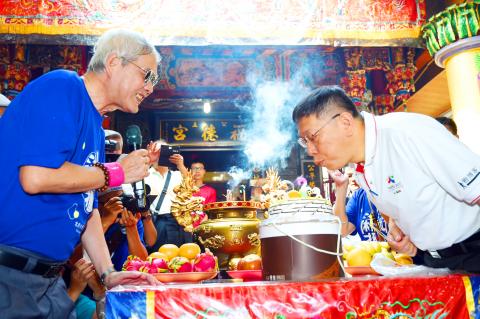With the accessibility of the Internet, now is the time to transition from a representative democracy to a direct democracy, Taipei Mayor Ko Wen-je (柯文哲) said yesterday.
The theme of his mayoral election campaign next year is to be “progressive values,” Ko said during a speech at National Taiwan University on Saturday, adding that the idea came from thinking about how he won the previous election by winning “a battle between generations,” but that it should progress into politics that are value-driven.
Values such as democracy, freedom and openness have become more important, he said, adding that since the city government’s planned budgets are open for public viewing online, city councilors’ supervision would not be needed.

Photo: Chien Jung-fong, Taipei Times
When asked about his remark yesterday at a rice harvest event in the city’s Beitou District (北投), Ko said that while ancient Greece had direct democracy, it evolved into a system of representative democracy because the population grew.
“With the popularity of the Internet in the 21st century, I think there is another way to appeal to public opinion,” he said. “This should be a transitional period from representative to direct democracy, and the way to make those adjustments can be considered further.”
However, Ko quickly added: “It is not a problem in Taipei, because our councilors are on average very professional. Some even say they are more professional than legislators, so I always make an effort to study the issues brought up by every councilor in council sessions.”
He said he still believes that politics will move toward direct democracy, but how long the transition will take is unknown, maybe up to 100 or 300 years.

The manufacture of the remaining 28 M1A2T Abrams tanks Taiwan purchased from the US has recently been completed, and they are expected to be delivered within the next one to two months, a source said yesterday. The Ministry of National Defense is arranging cargo ships to transport the tanks to Taiwan as soon as possible, said the source, who is familiar with the matter. The estimated arrival time ranges from late this month to early next month, the source said. The 28 Abrams tanks make up the third and final batch of a total of 108 tanks, valued at about NT$40.5 billion

A group from the Taiwanese Designers in Australia association yesterday represented Taiwan at the Midsumma Pride March in Melbourne. The march, held in the St. Kilda suburb, is the city’s largest LGBTQIA+ parade and the flagship event of the annual Midsumma Festival. It attracted more than 45,000 spectators who supported the 400 groups and 10,000 marchers that participated this year, the association said. Taiwanese Designers said they organized a team to march for Taiwan this year, joining politicians, government agencies, professionals and community organizations in showing support for LGBTQIA+ people and diverse communities. As the first country in Asia to legalize same-sex

Travel agencies in Taiwan are working to secure alternative flights for travelers bound for New Zealand for the Lunar New Year holiday, as Air New Zealand workers are set to strike next week. The airline said that it has confirmed that the planned industrial action by its international wide-body cabin crew would go ahead on Thursday and Friday next week. While the Auckland-based carrier pledged to take reasonable measures to mitigate the impact of the workers’ strike, an Air New Zealand flight arriving at Taipei from Auckland on Thursday and another flight departing from Taipei for Auckland on Saturday would have to

MOTIVES QUESTIONED The PLA considers Xi’s policies toward Taiwan to be driven by personal considerations rather than military assessment, the Epoch Times reports Chinese President Xi Jinping’s (習近平) latest purge of the Chinese People’s Liberation Army (PLA) leadership might have been prompted by the military’s opposition to plans of invading Taiwan, the Epoch Times said. The Chinese military opposes waging war against Taiwan by a large consensus, putting it at odds with Xi’s vision, the Falun Gong-affiliated daily said in a report on Thursday, citing anonymous sources with insight into the PLA’s inner workings. The opposition is not the opinion of a few generals, but a widely shared view among the PLA cadre, the Epoch Times cited them as saying. “Chinese forces know full well that